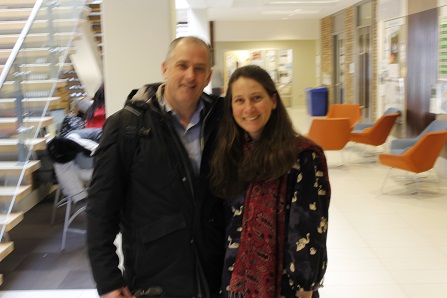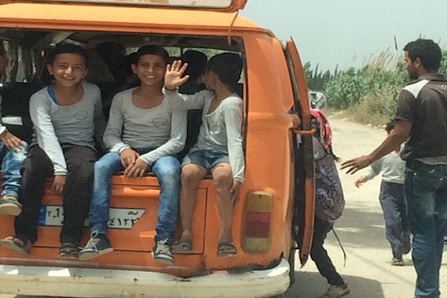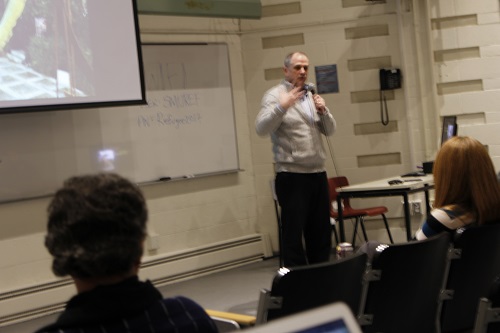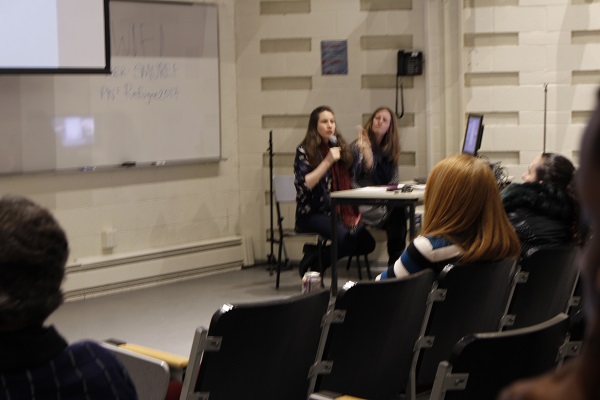Refugee Crisis
How Haligonians are making a difference in the plight of refugees
Refugee symposium highlights efforts of St. Andrew’s United Church and the Halifax Refugee Clinic

caption
Russell Daye and Yanery Navarro shared their stories at the refugee symposium.
caption
Children are picked up from refugee camps to attend a school funded by a Halifax church.A make-shift school bus filled with smiling faces arrives at a school for refugee children in Lebanon. At this school, funded by a local Halifax church, the children receive a good meal upon arrival.
For many of them, this will be the only full meal they have all day.
Stories like this one were shared at Saint Mary University’s annual refugee symposium this weekend. The event showcased some of the work being done for refugees in Halifax and in the Middle East.
Russell Daye, senior minister at St. Andrew’s United Church in Halifax, described the church’s efforts to help displaced refugees in a Lebanese town near the Syrian border.
“We wanted to sponsor refugees, but we also wanted to do something on the ground over there,” Daye said during his presentation.
The church currently sponsors two refugee families who came to Halifax from Somalia and Syria. But Daye said he knew this was not enough in light of the sheer scale of the refugee crisis.
Since November 2015, Canada has welcomed over 40,000 refugees according to the Government of Canada. This number is relatively small when compared with the United Nation’s data, which says 13.5 million Syrians are in need of assistance.
Education and medicine
St. Andrew’s Church’s work on the ground in Minyara, a Lebanese town five kilometres from the Syrian border, is having a major impact. The church has paid the property costs to establish schools for refugee children in the area, bringing moral as well as financial support. The church has also provided financial support for drugs to be supplied to refugees through a local medical clinic.
Daye worked for five years with the United Church of Canada on the truth and reconciliation process regarding residential schools. He said this experience taught him a valuable lesson and helped him find ways to improve the lives of Syrian refugees.
“I learned that the first kind of acting one has to do in any situation is the act of listening, and listening and listening some more,” Daye said. “Maybe somewhere down the line, in that long process of listening, you actually have something revealed to you that would be a helpful way to act.”

caption
Russell Daye described the work being done by his church to make life better for Syrian refugees.Daye sees education as the most important obstacle to overcome for displaced Syrian refugees.
“Health is a huge challenge, and education may even be a bigger challenge because what’s the most fertile ground for religious extremists of whatever form to predate and to recruit? It’s young men with nothing to do, who’ve been treated like shit in this world and who carry a narrative of anger,” Daye said. “It’s a self-replicating process if we don’t find some way to do something, and getting an education for some of them I think is a good place to start.”
Guiding through the process
Katie Tinker also spoke at the refugee symposium. Tinker works as a legal case manager at the Halifax Refugee Clinic, a non-profit organization that provides free legal and settlement aid to refugee claimants in Nova Scotia. She helps people make refugee claims, prepare for hearings and guides them through the permanent resident process.
Tinker said that since she started working at the refugee clinic in 2012, they have seen 56 of their 80 refugee hearings yield positive outcomes. Going through the process of making a refugee claim and facing the hearing alone can be quite daunting.
“You can come to Canada and make a refugee claim and it’s far from a guarantee that you’re going to be accepted,” Tinker told the audience. “These claims are assessed pretty stringently and anyone who’s gone through it can attest that the hearing itself can be very stressful and arduous. It’s a hard process to win, so we feel a little bit proud of ourselves at the clinic; I think we make a difference.”
New life in Halifax
Another presentation at the symposium was given by Catherine Baillie Abidi, with the help of Cuban refugee Yanery Navarro. Together they shared a photo-series from women who came to Atlantic Canada as refugees, and showed how these women are telling their stories through photography.
“The people directly affected are the best at telling the story — and should be telling the story,” Abidi said during her presentation.
Yanery Navarro is a refugee from Cuba who fled domestic violence and political persecution. Navarro shared her photos and poetry, and spoke about the connections she has made between her hometown of Matanza, Cuba, with her new home in Halifax.
“I cannot compare the Northwest Arm view with anything else; for me, it’s the most beautiful landscape,” Navarro said. “And I know that has to do with my hometown, and my province from Cuba in this case, and how I make the connection between the harbour in Havana with this little ‘harbour’ that we have on Quinpool. The architecture is exactly the same.
“Through these permanent connections I’ve found my peace and ways to evolve with my new life here.”

caption
Yanery Navarro and Catherine Abidi shared personal stories of refugee women starting new lives in Atlantic Canada.Navarro also shared ways in which her experiences in Halifax have positively transformed her way of living.
“I became vegan two years ago, and I am sure that this would not happen to me if I’m not living in Canada,” Navarro said during her presentation. “This is something that is directly related with the influence that this place has over myself, and how here we have this environmental conscience and we are aware of what happens with animal rights, and we are aware of the environment.”
In placing an importance on the notion of connection, Navarro said that, beyond forming connections between her new and old countries, there is a need for everyone in Halifax to work together and embrace the diversity refugees bring to Canada.
“Cohesion is one of the things that we need as a community,” Navarro said. “We need to understand the necessity of connections and cohesion between all the members and all diversity.”
